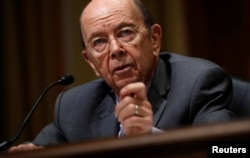U.S. President Donald Trump is threatening to impose a 20 percent tariff on vehicles assembled in the European Union and shipped to the United States, in retaliation for European tariffs on American imports.
On Friday, the day new EU tariffs went into effect, Trump tweeted, "...if these Tariffs and Barriers are not soon broken down and removed, we will be placing a 20% Tariff on all of their cars coming into the U.S. Build them here!"
Auto industry experts say such tariffs could negatively impact the U.S. economy, as well as Europe's.
"It's really a tangle; it's not a simple question" of cars being made in one place and sold in another, Kasper Peters, communications manager of ACEA, the European Automobile Manufacturers Association, said Friday in an interview with VOA.
In March, ACEA Secretary General Erik Jonnaert noted the impact European carmakers with plants in the United States have on local economies. "EU manufacturers do not only import vehicles into the U.S. They also have a major manufacturing footprint there, providing significant local employment and generating tax revenue," Jonnaert said in a statement.
U.S. Commerce Secretary Wilbur Ross said earlier this week that his department plans to wrap up by July or August an investigation into whether imported cars and car parts are a threat to national security. But Daniel Price, a former senior economic adviser to President George W. Bush, told The Washington Post that Trump's threat of new tariffs "short-circuited the ... process and conclusively undercut the stated national security rationale of that investigation."
The new EU tariffs enacted Friday apply to billions of dollars' worth of American goods — including jeans, bourbon and motorcycles.
The action is the latest response to Trump's decision to tax imported steel and aluminum.
The U.S. is scheduled to start taxing more than $30 billion in Chinese imports in two weeks.
Like the EU, China has promised to retaliate immediately, putting the world's two largest economies at odds.
A U.S. Chamber of Commerce senior vice president, John Murphy, was cited by the Associated Press as saying he estimates that $75 billion in U.S. products could be subjected to new foreign tariffs by the end of the first week of July.
Separately, a spokesman for China's Commerce Ministry said, "The U.S. is abusing the tariff methods and starting trade wars all around the world."
"Clarity [is] still lacking about how far things will ultimately go between [the] U.S. and China and the potential ripple effect for world trade," said financial analyst Mike van Dulken.
During his presidential campaign, Trump promised to apply tariffs, saying countries around the world had been exploiting the U.S.
A former White House trade adviser says Trump "has been so belligerent that it becomes almost impossible for democratically elected leaders — or even a non-democratic leader like [Chinese President] Xi Jinping — to appear to kowtow and give in."
Phillip Levy, a senior fellow at the Chicago Council on Global Affairs, said, "The president has made it very hard for other countries to give him what he wants."






